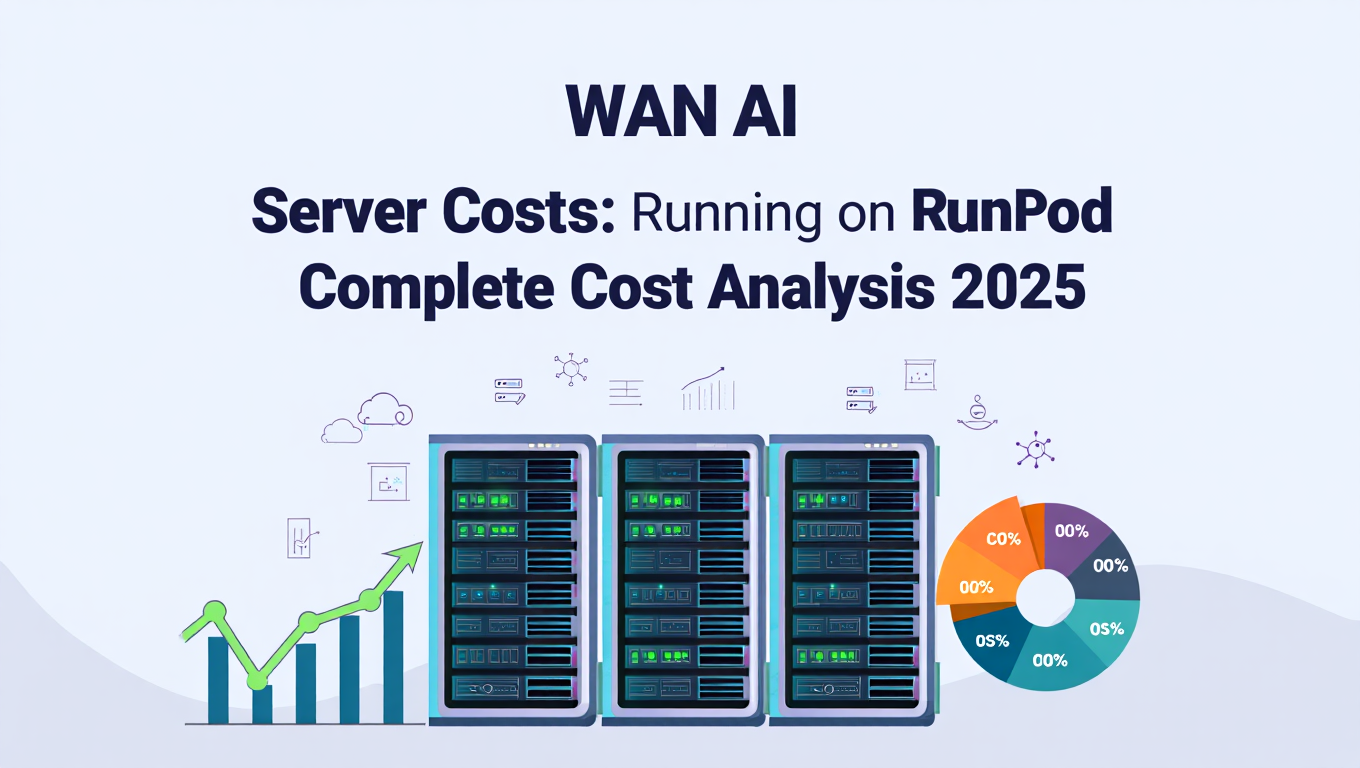WAN AI Server Costs: Running on RunPod Complete Cost Analysis 2025
Detailed cost breakdown for running WAN 2.2 on RunPod cloud GPUs. GPU options, pricing tiers, optimization strategies, cost comparison vs local setup.

Quick Answer: Running WAN 2.2 on RunPod costs $0.30-1.00 per hour depending on GPU tier (RTX 4090 $0.69/hr, A6000 $0.89/hr). Generating 10-second video takes 8-15 minutes, costing $0.10-0.25 per video. Monthly cost for 100 videos ranges from $10-25, significantly cheaper than managed services like Runway ML ($120+/month) but more expensive than local generation after hardware payback period.
- GPU pricing: $0.30-1.00/hour depending on model
- Per-video cost: $0.10-0.25 for 10-second clips
- Monthly (100 videos): $10-25 with optimization
- vs Runway ML: 75-80% cheaper at high volume
- vs Local setup: More expensive after 12-18 months
- Best for: Testing, burst workloads, avoiding hardware investment
I was staring at GPU prices. RTX 4090: $1,600. My bank account: definitely not $1,600. But I had a client project that needed WAN 2.2 video generation. Found RunPod, saw "$0.69/hour" and thought "that's cheap, I'll just use this."
Generated 20 test videos at about 12 minutes each. My first bill: $3. Perfect. Then I got busy with the real project, left the instance running overnight by accident. Woke up to a $23 bill for 32 hours of idle GPU time.
Learned real fast that RunPod is amazing if you remember to shut down your instances. Expensive if you don't. Now I set 2-hour auto-shutdown timers on everything.
- Detailed RunPod pricing breakdown by GPU tier
- Real-world cost examples for various generation volumes
- Hidden costs and optimization strategies
- Local vs cloud break-even analysis
- Best practices for minimizing RunPod expenses
- Alternative cloud GPU providers comparison
What Are RunPod's GPU Options and Pricing?
RunPod offers multiple GPU tiers suitable for WAN 2.2 video generation.
GPU Tier Comparison
| GPU Model | VRAM | Hourly Rate | WAN 2.2 Performance | Best For |
|---|---|---|---|---|
| RTX 4090 | 24GB | $0.69/hr | Excellent (10min/video) | Balanced cost/performance |
| RTX A6000 | 48GB | $0.89/hr | Excellent (8min/video) | Large batch processing |
| RTX 3090 | 24GB | $0.44/hr | Good (15min/video) | Budget option |
| A40 | 48GB | $0.79/hr | Very Good (10min/video) | Professional reliability |
| RTX 6000 Ada | 48GB | $1.29/hr | Excellent (7min/video) | Maximum performance |
Pricing Notes:
- Rates vary by availability and data center
- Secure cloud instances cost 10-20% more
- Community cloud cheaper but less reliable
- Spot instances can save 50% but risk interruption
WAN 2.2 Minimum Requirements
For 720p Generation:
- Minimum: 12GB VRAM (RTX 3090, 4090)
- Recommended: 16GB+ VRAM
- Model: WAN 2.2 5B or 14B
For 1080p Generation:
- Minimum: 16GB VRAM
- Recommended: 24GB+ VRAM
- Model: WAN 2.2 14B models
Storage Requirements:
- ComfyUI installation: 15GB
- WAN 2.2 models: 25-50GB depending on variant
- Working space: 20GB minimum
- Total: 60-85GB storage
RunPod charges $0.10/GB/month for persistent storage. Initial setup requires 60-85GB = $6-8.50/month storage fee.
Real-World Cost Examples
Understanding costs requires realistic usage scenarios.
Scenario 1: Casual Creator (10 Videos/Month)
Usage Pattern:
- 10 videos, 10 seconds each
- RTX 4090 GPU ($0.69/hr)
- 12 minutes generation time per video
- Total compute: 2 hours/month
Cost Breakdown:
- Compute time: 2 hours × $0.69 = $1.38
- Storage (60GB): $6.00/month
- Total: $7.38/month
Comparison:
- Runway ML Basic: $12/month (limited generations)
- Local RTX 4090: $1,600 upfront, $2/month electricity
- RunPod Winner: For casual use, cheapest option
Scenario 2: Content Creator (100 Videos/Month)
Usage Pattern:
- 100 videos, 10 seconds each
- RTX 4090 GPU
- 12 minutes per video average
- Total compute: 20 hours/month
Cost Breakdown:
- Compute: 20 hours × $0.69 = $13.80
- Storage: $6.00/month
- Total: $19.80/month
Comparison:
- Runway ML Standard: $76/month
- Kling AI Professional: $120/month
- Local RTX 4090: $133/month (amortized over 12 months)
- RunPod Winner: Until month 12, then local becomes cheaper
Scenario 3: Professional Studio (500 Videos/Month)
Usage Pattern:
- 500 videos monthly
- Mix of RTX 4090 and A6000
- Average 11 minutes per video
- Total compute: 92 hours/month
Cost Breakdown:
- Compute: 92 hours × $0.69 = $63.48
- Storage (100GB): $10.00/month
- Total: $73.48/month
Comparison:
- Multiple Runway subscriptions: $200+/month
- Local RTX 4090: $133/month (first year), $2/month thereafter
- Local Winner: For high volume, local setup pays off quickly
Scenario 4: Burst Project (1000 Videos in One Week)
Usage Pattern:
- 1000 videos needed quickly
- Rent 5× RTX 4090 simultaneously
- Complete in 40 hours total (8 hours per GPU)
Cost Breakdown:
- Compute: 40 hours × $0.69 × 5 GPUs = $138
- Storage (one week): $0.15
- Total: $138.15
Comparison:
- Local: Impossible without 5 GPUs ($8,000 investment)
- Runway: ~$200 + overage fees
- RunPod Winner: For burst workloads, cloud flexibility invaluable
Hidden Costs and Optimization Strategies
Published hourly rates don't tell the complete story.
Hidden Cost Factors
Idle Time: RunPod charges while instance runs, even during non-generation periods (workflow setup, troubleshooting, model loading).
Strategy: Terminate instances when not actively generating. Restart when needed. Adds 2-3 minutes startup but eliminates idle charges.
Data Transfer:
- Download: Free
- Upload: Free (within limits)
- Large model uploads can be slow
Strategy: Use RunPod's built-in model library or S3 pre-loaded templates to avoid repeated uploads.
Storage Accumulation: Output videos accumulate in storage. 100 videos = 5-10GB depending on settings.
Strategy: Download outputs regularly and delete from RunPod storage. Only keep working files.
Free ComfyUI Workflows
Find free, open-source ComfyUI workflows for techniques in this article. Open source is strong.
Template Setup Time: First-time ComfyUI + WAN 2.2 setup takes 30-60 minutes of paid GPU time.
Strategy: Use community templates with pre-installed ComfyUI and WAN 2.2. Skip straight to generation.
Cost Optimization Techniques
Use Spot Instances: 50% cheaper than on-demand but can be interrupted. Fine for experimentation, risky for production.
Batch Processing: Generate multiple videos per session. Setup time (5-10 min) amortized across all videos.
Lower Resolution Testing: Test prompts at 512px, only generate finals at 720p/1080p. Saves 60-70% cost during iteration.
Model Selection: WAN 2.2 5B generates nearly as good as 14B for many use cases but 30% faster = 30% cheaper.
Off-Peak Timing: Some GPU tiers show price variance by demand. Check rates at different times if flexible.
Persistent Storage Cleanup: Delete old workflows, temporary files, cached models. Every GB saved = $0.10/month.
Local vs RunPod Break-Even Analysis
When does local hardware investment make financial sense?
Cost Comparison Over Time
Local Setup (RTX 4090):
- Initial cost: $1,800 (GPU) + $400 (system) = $2,200
- Monthly cost: $5 electricity + $2 maintenance = $7
- Year 1 total: $2,284
- Year 2 total: $2,368 ($84 ongoing)
- Year 3 total: $2,452
RunPod (100 Videos/Month):
- Monthly cost: $20 (compute + storage)
- Year 1 total: $240
- Year 2 total: $480
- Year 3 total: $720
Break-Even Point: Month 11-12 at 100 videos/month
Volume Impact on Break-Even:
Want to skip the complexity? Apatero gives you professional AI results instantly with no technical setup required.
| Monthly Videos | RunPod Monthly Cost | Break-Even Month |
|---|---|---|
| 25 videos | $8 | Never (RunPod always cheaper) |
| 50 videos | $12 | Month 16 |
| 100 videos | $20 | Month 12 |
| 200 videos | $38 | Month 7 |
| 500 videos | $75 | Month 4 |
Conclusion: Higher volume = faster payback for local hardware. Under 50 videos/month, RunPod remains cost-effective indefinitely.
Flexibility Value
RunPod Advantages:
- Scale up/down instantly
- Access to multiple GPU types
- No maintenance or upgrades
- Geographic flexibility
- Zero commitment
Local Advantages:
- Unlimited generation after payback
- No network latency
- Complete privacy
- Customization freedom
- Long-term cheapest option
Hybrid Approach: Many professionals use local for routine work, RunPod for burst needs or travel. Best of both worlds.
Alternative Cloud GPU Providers
RunPod isn't the only option for cloud WAN 2.2 generation.
Vast.ai
Pricing: $0.20-0.80/hr depending on GPU Pros: Often cheaper, large GPU selection Cons: More technical setup, less reliable, community marketplace model
Best For: Advanced users comfortable troubleshooting, absolute lowest cost priority.
Paperspace
Pricing: $0.51-0.76/hr for suitable GPUs Pros: Excellent UI, reliable infrastructure, good documentation Cons: Limited GPU availability, higher prices than RunPod
Best For: Users prioritizing ease of use over absolute lowest cost.
Lambda Labs
Pricing: $0.50-1.10/hr Pros: Simple setup, reliable, good performance Cons: Often sold out, limited locations
Best For: Users who value reliability and need assured availability.
Managed Platforms (Apatero.com)
Pricing: $0.50-2.00 per video (usage-based) Pros: Zero setup, optimized workflows, reliable results, no GPU management Cons: Higher per-video cost than raw GPU rental
Join 115 other course members
Create Your First Mega-Realistic AI Influencer in 51 Lessons
Create ultra-realistic AI influencers with lifelike skin details, professional selfies, and complex scenes. Get two complete courses in one bundle. ComfyUI Foundation to master the tech, and Fanvue Creator Academy to learn how to market yourself as an AI creator.
Best For: Users wanting results without infrastructure management or technical knowledge.
Best Practices for RunPod WAN 2.2 Workflows
Maximizing efficiency reduces costs and frustration.
Template Setup
Recommendation: Use pre-configured RunPod templates with ComfyUI + WAN 2.2 already installed.
DIY Setup (First Time):
- Launch RTX 4090 instance
- Install ComfyUI via git
- Install WAN 2.2 custom nodes
- Download models (25-50GB, takes time)
- Configure workflows
- Total time: 45-90 minutes = $0.50-1.00 cost
Template Approach:
- Launch instance with pre-configured template
- Verify models loaded
- Start generating
- Total time: 3-5 minutes = $0.04-0.06 cost
Save Your Setup: Create custom template after first setup. Future launches use your configuration instantly.
Efficient Workflow Design
Batch Queueing: Queue 10-20 prompts at once. ComfyUI processes sequentially without manual intervention. You pay for GPU time regardless of whether you're watching, so batch processing maximizes value.
Prompt Validation: Test prompts locally or on cheaper GPU before final generation on expensive tier. Avoid costly trial-and-error on high-end GPUs.
Workflow Optimization: Optimize ComfyUI workflows for speed. Faster generation = lower cost per video. Review our WAN 2.2 optimization guide for techniques.
Cost Monitoring
Track Usage: RunPod provides usage dashboard. Monitor costs daily when starting to calibrate expectations.
Set Alerts: Configure email alerts at spending thresholds ($10, $25, $50). Prevents surprise bills from accidentally leaving instances running.
Terminate Instances: Always terminate when finished. Paused instances still incur some charges. Full termination eliminates all compute costs.
When Should You Choose Each Option?
Choose RunPod When:
- Generating under 100 videos/month
- Testing WAN 2.2 before hardware investment
- Need burst capacity for specific projects
- Want access to multiple GPU types
- Traveling without powerful laptop
- Avoiding $2,000+ upfront hardware cost
Choose Local Setup When:
- Generating 100+ videos/month consistently
- Privacy critical (sensitive content)
- Want unlimited experimentation
- Have technical skills for setup/maintenance
- Can afford upfront investment
- Long-term video generation plans
Choose Managed Platforms (Apatero.com) When:
- Want zero technical complexity
- Need reliable, consistent results
- Prefer usage-based pricing
- Value time more than absolute lowest cost
- Focus on creative work, not infrastructure
Check our complete PC requirements guide for local hardware recommendations, and WAN 2.2 setup guide for comprehensive installation instructions.
Recommended Next Steps:
- Estimate your realistic monthly video generation volume
- Calculate costs for RunPod at that volume
- Compare to local hardware amortized cost
- Test RunPod with free credit or small initial budget
- Make informed decision based on actual usage patterns
Additional Resources:
- RunPod Official Documentation
- WAN 2.2 Complete Guide
- Local AI Hardware Guide
- Cloud GPU Comparison Tools
- Use RunPod if: Under 100 videos/month, testing workflows, burst needs, avoiding upfront cost
- Go local if: High volume (100+ monthly), long-term commitment, privacy critical, have technical skills
- Use Apatero.com if: Want professional results without setup, prefer simple usage-based pricing, value convenience
RunPod provides excellent middle-ground between expensive managed services and large local hardware investment. For many creators, it's the optimal solution - professional GPU access without commitment or complexity. Understanding the true costs including hidden factors enables smart decisions that maximize value while minimizing waste.
The cloud GPU market continues evolving with more providers and better pricing. What costs $0.69/hour today may cost less tomorrow. But the fundamental calculation remains: Compare your real usage needs against upfront local costs vs ongoing cloud costs to make the economically rational choice for your specific situation.
Frequently Asked Questions
How do RunPod charges work exactly?
Per-second billing rounded to nearest minute. Charged while instance running, regardless of active generation. Storage billed monthly at $0.10/GB. No hidden fees beyond compute + storage. Terminated instances cost nothing.
Can I pause instance to save money?
Yes, paused instances stop compute charges but storage remains. Useful for short breaks (lunch, overnight). For longer periods, terminate and restart when needed. Startup time 2-3 minutes.
What happens if my instance crashes mid-generation?
You're charged for time used until crash. Unsaved work lost. Use persistent storage to save workflows and outputs regularly. Community cloud less reliable than secure cloud for critical work.
Do I need to download models every time?
No. Use persistent storage to keep models between sessions. Or use pre-configured templates with models included. Avoid re-downloading 50GB models repeatedly.
How fast is RunPod compared to local RTX 4090?
Essentially identical performance for same GPU model. Network latency negligible for video generation. Main difference is startup time (2-3 min cloud vs instant local) and iteration speed (download outputs vs immediate local access).
Can I run multiple videos simultaneously?
Yes, with proper workflow setup. One GPU processes one video at a time sequentially. To generate multiple videos in parallel, rent multiple GPU instances simultaneously. Cost scales linearly.
What's the minimum commitment?
None. Pay only for what you use. No monthly minimums or subscription required. Ideal for testing and irregular usage patterns.
Are there volume discounts?
Not officially. Heavy users sometimes negotiate with RunPod directly. Community cloud pricing varies by supply/demand. Check rates at different times.
How do I control costs if I'm new?
Set low balance limit ($10-20 initially). Enable email alerts. Terminate instances after each session. Monitor usage dashboard daily. Start with cheaper GPUs (RTX 3090) before upgrading to 4090.
Is RunPod cheaper than Vast.ai or Paperspace?
Usually competitive. Vast.ai often cheaper but less reliable. Paperspace sometimes more expensive but better UX. Compare current rates as prices fluctuate. RunPod generally best balance of cost/reliability/ease.
Ready to Create Your AI Influencer?
Join 115 students mastering ComfyUI and AI influencer marketing in our complete 51-lesson course.
Related Articles

10 Most Common ComfyUI Beginner Mistakes and How to Fix Them in 2025
Avoid the top 10 ComfyUI beginner pitfalls that frustrate new users. Complete troubleshooting guide with solutions for VRAM errors, model loading issues, and workflow problems.

25 ComfyUI Tips and Tricks That Pro Users Don't Want You to Know in 2025
Discover 25 advanced ComfyUI tips, workflow optimization techniques, and pro-level tricks that expert users leverage. Complete guide to CFG tuning, batch processing, and quality improvements.

360 Anime Spin with Anisora v3.2: Complete Character Rotation Guide ComfyUI 2025
Master 360-degree anime character rotation with Anisora v3.2 in ComfyUI. Learn camera orbit workflows, multi-view consistency, and professional turnaround animation techniques.
.png)